- Home
- Michael Scott
Saint Patrick Page 2
Saint Patrick Read online
Page 2
Outside, he dropped me on the ground. A foot dug into my back suddenly, and a thick rope closed around my neck. Then, leading me like an animal, he set off toward the shore.
The beach was crowded with pirates and townspeople. Most of my neighbors were tied up like me, but some were being forced to load the boats with what the pirates had stolen. Many moaned and cried, while the pirates roared and barked orders in what sounded like many languages.
The fires the pirates started had taken hold. More and more houses were exploding into flame, tiles cracking, walls crumbling, wooden beams and doors snapping, filling the night sky with cinders and sparks.
Sinking to my knees, I squeezed my eyes shut and pressed my hands against my ears, trying to shield myself form the terrible sights and sounds.
When all the stolen goods were loaded up, the pirates began herding us aboard the ships. By now, a full moon had risen high in the heavens. It colored the water silver and black, contrasting with the red-gold reflections from the fire. Could I be dreaming?
Someone shoved me from behind and I splashed into the icy water. It was so cold it took my breath away. I knew then that this was no dream.
As I was roughly pulled from the water onto the boat, a tall, muscular pirate strode past me. Thick golden hair was kept out of his eyes by a thin gold headband. This had to be the pirate captain. The prisoner in front of me leaned forward to whisper something to the man ahead of him in the line. I caught a single word. Novem. Nine.
And in that moment I knew that all was lost.
I was six and ten years old and I had been captured. I was now a slave of the Irish King, Niall of the Nine Hostages.
Chapter Two
Captivity
We were at sea for four days, or maybe five. It was hard to tell. The voyage seemed to last forever. All of us captives spent the journey on deck. Luckily the weather was mild, although at night it became very cold. The thin blankets and ragged cloaks the pirates threw over us did little to keep out the chill.
The pirates fed us hard bread, and we had plenty of water. One of the other prisoners told me that the pirates weren’t exactly being kind by feeding us. They did it more for their own sakes than for ours; we would be sold as slaves upon landing, and healthy, well-fed slaves would be worth more money.
I was not on the pirate chief’s boat. A few times, his ship neared the one I was on, and I caught sight of his golden hair blowing in the wind. Niall of the Nine Hostages was said to have inherited his yellow hair from his mother, who was from my own country. What had led him to a life like this? I wondered.
On the morning of the fourth or fifth day, the pirates’ lookout called “Land!” at the top of his lungs. All the pirates cheered. Although I was tired and had spent the night sneezing and shivering, I raised myself as high as I could to look out over the ship’s rail at the low hills on the horizon.
I turned to one of the townspeople who was shackled beside me. “Where are we?” I whispered.
The man looked at me as if I was mad. “This is the Land of Erin,” he snapped, “a place of monsters and terrors. This is the island on the edge of the world.”
“I know,” I said impatiently, “but where?”
The old man shook his head. “Does it matter?” he grumbled. Then, seeing that I was still hopeful for an answer, he sighed and added, “Laighin, probably, on the east coast.”
I had caught a chill on the voyage across the Irish Sea. My forehead burned with fever, so my memories of the next few days are unclear. I can remember being hauled ashore with the rest of the enslaved people, the rasp of the heavy ropes around our necks pulling us along.
I can remember a town, a dirty, noisy, smelly town, reeking with the familiar seaside stench of fish and animal droppings. There were pigs, sheep, and goats everywhere, and hens ran cackling through the unpaved muddy streets. There was a lot of shouting, and I can remember being separated from the rest of the slaves. Alone, I was hauled off by one man—a huge, hairy man, whose cloak smelled strongly of sheep droppings.
My mind was in such a haze that I don’t remember being sold to him. During the journey to his hill fort, I was forced to run along behind his chariot, staggering with hunger and exhaustion, the fever making me hot and cold in turn. What I remember most clearly is his face, that ugly face bending over me with foul breath, his teeth nothing more than blackened stubs. He said one word—“Miliuc”—and patted himself on the chest.
I knew then that he was naming himself. I tried to say my own name, but I was too tired and no words came out. In any case, the man had walked away. I was his property, and he wasn’t interested in knowing the name of a slave.
The following morning I was taken out to a mountainside where dirty sheep roamed. The slave who had accompanied me pointed and said a word that sounded like “Slemish.” Then he walked away.
And so I was set to herd sheep on Mount Slemish.
I think I nearly died in those first few days. You must I remember that I had grown up with servants of my own and had had to do very little work myself. I had led a privileged life. Now, suddenly, I was being thrown out into the rain and cold, with no clothing other than what I’d been wearing the night I had been kidnapped, a single ragged blanket, and no proper food or shelter.
Those first days were the hardest. My hands and feet bled with the cuts from stones, and I thought I would die of hunger and thirst, or shake myself to death with the cold and wet. This was the Land of Erin. and it rained every day.
However, I survived. I am sure now that God kept me safe during those early days. I’m sure that He led me to the tiny cave where I lived for the next seven years, and I’m sure He gave me the idea of gathering the tufts of wool from the sheep’s coats and twisting them into rough blankets to keep the chill off at night.
It was a cruel life, but I cannot say that Miliuc was a cruel man. I rarely saw him, although I occasionally saw his son, Miliuc Og. It was from him that I learned my first few words of the Irish language. Sometimes Miliuc would ride out to inspect his flocks. If the weather was particularly bad, he would help me dig the sheep out of the snow, and during the lambing season he would send people to give me a hand.
Usually I had the hill to myself.
With no one else to talk to, I talked to God. It’s easy to talk to God when you are lying on your back on a grassy hill staring up at the starry heavens, watching tiny points of light glitter and sparkle against the purple sky. It’s easy to talk to God when you’re alone on a hillside with nothing but the sound of the wind in your ears and the smell of the sea in your face.
All day, every day, I talked to God…and He listened to me. And then one day He answered me.
I don’t know how long I’d been on the mountain when I started hearing the voice. Time had little meaning then; I measured its passing by the seasons, and by the changes I noticed in myself. I had grown, certainly. I was taller and stronger, and my hands and feet had hardened and toughened. I could climb the rockiest mountainside without slipping, wade though the dampest marshes without any discomfort, and run all day after my sheep without pausing for breath. After all those years on the mountainside, neither summer’s blistering heat nor winter’s bitter chill bothered me, and I felt equally at home with either the rain or the sun on my face.
Later, much later, I realized that God had given me these experiences to prepare me for my life as a missionary, when I would have to cross Erin’s roads in all sorts of weather, spreading His word.
At first the voice was nothing more than a whisper carried on the wind. Whenever I turned to catch the sound, to hear it clearly, it had already gone. Sometimes I would hear it in the trickle of rain on the stones, or in the rustling of the long grasses in the sea breezes. Eventually, I even started hearing it in my dreams.
The voice was thin and high. It recalled the sound a single drop of water makes when it
lands in a pool. When I heard it, I pictured snow and ice, and a silver moonlit horizon.
Finally, the voice began speaking to me throughout the morning and night. I grew to depend on it, and I was disappointed if a day passed without my hearing it. When the voice spoke, it promised me a future with God. It promised that I would be a great missionary, that I would one day bring the Word of God to all the barbarian peoples of Erin.
I only half-believed this prophecy. At that time I never imagined I would leave the mountain. I believed I really was destined to remain a slave and a shepherd for the rest of my life.
And then, one night, I met the speaker of that pure, ghostly voice.
It was at the end of a long day. An older sheep had become entangled in some thorns, and I was trying to free her. That was when I felt a presence behind me. Strangely, I wasn’t frightened—though I had reason to be, for the local warlords often raided each other’s stocks of sheep and cows. Enslaved people had less value than the animals and would often be killed without a second thought.
Yet as I turned, I didn’t feel threatened. There, before me, stood a person, a figure, a creature, an essence—all rolled into one. To this day, I remain unsure whether it was a man or a woman, since it was difficult to make out any features. The figure was tall and broad, and dressed in a long robe of shimmering white that gave off no light and threw no shadows.
“Who are you?…What are you?” I gasped.
“I am Victoricus. I am an angel of the Lord.”
The voice seemed to come from deep within my head, thin and fragile like dripping water.
“Would you like to leave this land? Would you like to return to your own country and your family? Would you like to follow the Way of the Lord?”
The voice pressed on, the questions coming quickly, leaving no pause for me to answer.
Finally I managed to nod. “Yes. Yes. I would.”
The angel lifted its right arm and pointed to the south and west. “There is a boat in a harbor half a night’s walk from here. It will take you away from this place.”
“The crew will know I am a runaway slave,” I replied in disbelief. “They’ll not take me.”
“They will take you,” Victoricus said. And then the light from the shimmering robe grew brighter and I threw up my hand to shield my eyes. When I could see again, the angel had vanished, leaving me wondering if it had ever been there in the first place.
And then I looked down at the grass. In a circle where the angel had stood, dozens of tiny white flowers had appeared. They had bloomed into a white carpet.
I knew what I had to do.
I set off in the direction Victoricus had indicated, leaving Slemish without a backward glance.
I had spent seven years a slave, ever since I’d been sixteen years old. Now I was about to begin my journey home.
Chapter Three
Escape
The farther I walked, the more I began to doubt Victoricus’s word. I had been listening the voice for years, and it had never let me down or led me astray. But this was different: now, because I had listened to the voice, I was a runaway slave.
Then, quite suddenly, a small harbor appeared ahead of me. It was sheltered in a deep cove, surrounded by mountains and trees. A dozen boats were rocking on the waves, mostly long, thin fishing boats. Farther offshore, there were a few larger trading vessels.
I sprinted down the slope, straight toward the water. The moon was bright overhead, turning the waves black and silver. And the boats looked like nothing more than shadows on the sea.
But which boat had the angel meant for me to take?
I was looking for a sign—anything that might lead me to the right one.
I saw nothing.
“Victoricus, help me now,” I whispered .
And then two eyes blinked open on the water. It took me a moment before I realized that the glowing cream-colored eyes were lights—and I guessed that this was my boat. Squinting into the night, I could just see that the large trading ship was hauling up its anchor, preparing to leave the harbor on the night tide.
I dashed down onto the beach. “Wait!” I cried. “Wait for me.” My voice echoed across the waves. On deck, the shapes of white heads appeared out of the darkness. I splashed into the shallows, waving desperately at the boat.
“You’ve got to wait for me!” I said urgently.
“What do you want?” The voice was rough and harsh and spoke Irish with an accent not unlike my own. I immediately switched to Latin, a language I had not used in seven years. “Take me with you. Please.”
One man stood up in the stern of the boat and looked back at me. I was clearly outlined in the moonlight against the pale, white stones of the beach. “You’re a slave,” the man replied in Latin, looking at my ragged clothes and long, tangled hair.
“Please! Take me with you.” I begged.
“Go back to your master,” the man advised, not unkindly. “If you get back by morning, he mightn’t even know you’ve been gone for the night. If he finds you missing in the morning, though…,” he added darkly, “well, it will not go well for you. A runaway slave is worthless.” Behind him, some of his crew laughed. “Now away with you.” The man stepped down and vanished into the shadows.
Tears stung my eyes. I had not cried in a long time. I was tired, so tired, and couldn’t remember when I’d last eaten. All sorts of briars, branches, and brambles had scraped my arms and legs along the way, and my muscles ached. Now that I had stopped moving, the chill night air took hold and I began to shiver. I was aware of the bitterly cold water lapping around my knees. Slowly, painfully slowly, I turned and made my way back up the beach.
Dropping onto the round polished stones, I prayed.
Finally, I lay down on the beach, drew my knees up, and wrapped my arms around them. I would rest for a few moments and then try to make my way back to Slemish before dawn; maybe I could get back before I was found missing. Looking at the sky, however, I could see that it was already beginning to pale in the east. I would never make it back to the mountainside before sunrise.
What had I done? What had I been thinking, fleeing like that? And now what would become of me? A long time ago, Miliuc had warned me that the punishment for runaway slaves was death!
I looked back out over the water. Perhaps if I had arrived a few seconds earlier, I might have been I able to creep aboard and hide until they were under way. Or I could have helped them load the boat, and they would have allowed me to go with them. Perhaps…
The lights had returned!
I was rising to my feet when a voice echoed out from the boat. “You, boy…you, ashore. Are you still there?”
I stood up and waved. “I’m here.”
“You’ve put a spell on us, boy,” the voice said, half angry, half afraid.
I shook my head quickly, and then, realizing that the man might not be able to see me, called out, “Not I. I don’t believe in such pagan magic.”
“You must have—we cannot get out of the harbor. The waves keep pushing us back. If we agree to take you with us, will you lift your spell?”
I was about to say that I hadn’t cast any spell, but I knew the sailor wouldn’t believe me. “Fine,” I said, trying to sound certain. “Take me with you and you will be able to sail freely out to sea.”
“Come aboard, then.”
I splashed into the chill water again. The cold didn’t bother me anymore as I swam out to the boat. Strong, rough hands dragged me aboard. The men aboard were muttering, their voices angry.
“Doesn’t look like a wizard to me….”
“Throw him back….”
“Kill him.”
I scrambled to my feet. “If you kill me, or harm me in any way,” I said, trying to sound braver than I felt, “then you will never leave this harbor. My God protects me.”
&nbs
p; The sailors muttered among themselves. They were, I could now see, afraid of me. I noticed some of them closing their left hands into fists but leaving the little and forefinger sticking out straight. This was an ancient pagan way of protecting against evil and was called the Sign of Horns.
One of the men stepped forward. He was tall and broad, with a wild, tangled beard. When he spoke, I immediately knew it was the same man I had spoken to a little earlier. “Who is your god, boy?” he asked, peering at me curiously. In those days there were many gods and goddesses in the world.
“I believe in the three gods that are one: the Father, the Son, and the Holy Spirit. The three that are one, the one that is all.”
“These are powerful gods?” the man asked, furrowing his brow.
“Powerful enough to keep you here in this harbor.”
Slowly, he nodded. “We will sail now,” he said, turning away, “but you can teach us about these gods of yours in the morning.”
We sailed out of the harbor with ease.
Chapter Four
Captured Again
Our journey lasted three days. On the last one, wind and waves swept our ship far off course. Some of the crewmen watched me suspiciously, as if this had been my fault. “Throw him overboard,” they murmured to one another. But their captain would not allow them. Though he protected me from the others, he avoided speaking to me as much as possible, and didn’t even introduce himself to me by name. In those days, men often kept their real names secret in order to protect themselves from magic. If a magician didn’t know a man’s real name, he couldn’t enchant him. I think the captain was afraid that I was a magician.

 The Warlock
The Warlock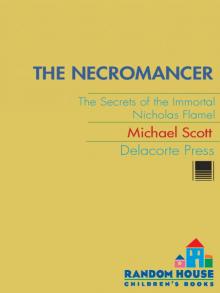 The Necromancer
The Necromancer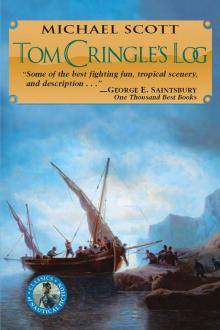 Tom Cringle's Log
Tom Cringle's Log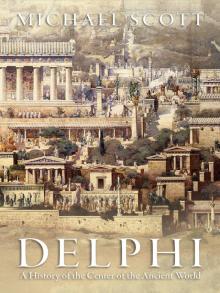 Delphi
Delphi The Magician
The Magician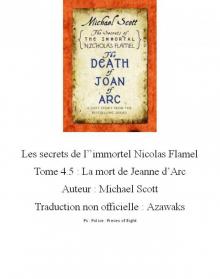 La mort de Jeanne d'Arc (trad. privee)
La mort de Jeanne d'Arc (trad. privee)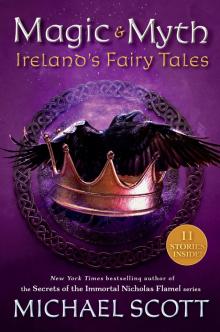 Magic and Myth
Magic and Myth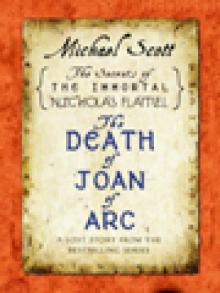 The Death of Joan of Arc
The Death of Joan of Arc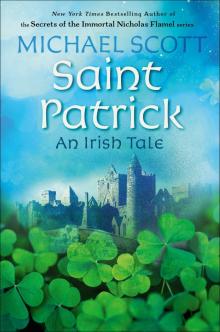 Saint Patrick
Saint Patrick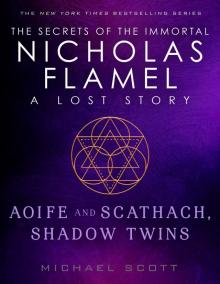 Aoife and Scathach, Shadow Twins
Aoife and Scathach, Shadow Twins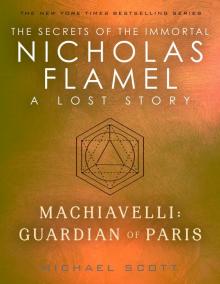 Machiavelli
Machiavelli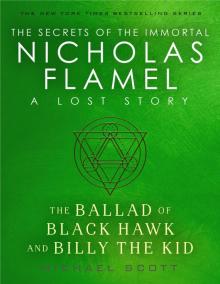 The Ballad of Black Hawk and Billy the Kid
The Ballad of Black Hawk and Billy the Kid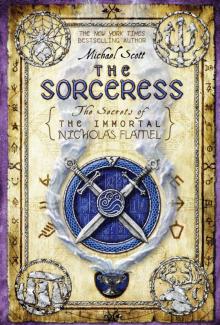 The Sorceress
The Sorceress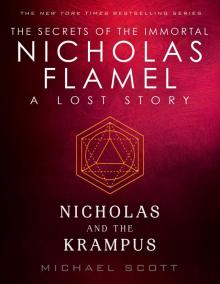 Nicholas and the Krampus
Nicholas and the Krampus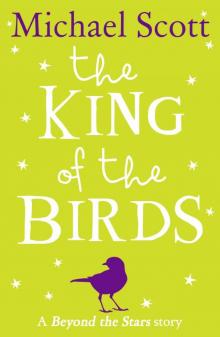 The King of the Birds
The King of the Birds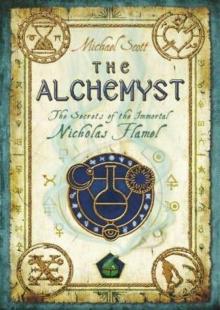 Nicholas Flamel 1 - The Alchemyst sotinf-1
Nicholas Flamel 1 - The Alchemyst sotinf-1 Shakespeare- a Complete Introduction
Shakespeare- a Complete Introduction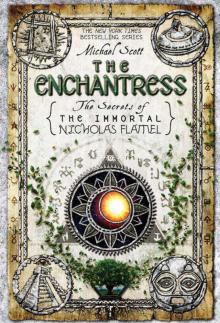 06 The Enchantress
06 The Enchantress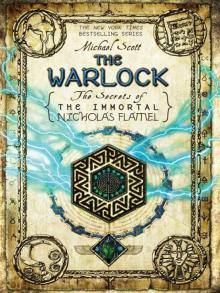 05 The Warlock
05 The Warlock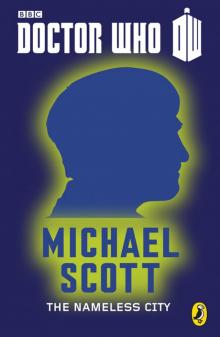 The Nameless City
The Nameless City The Necromancer sotinf-4
The Necromancer sotinf-4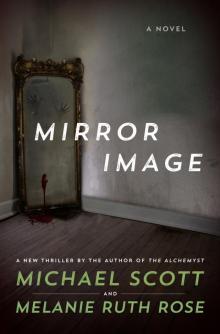 Mirror Image
Mirror Image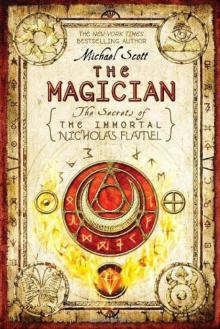 Nicholas Flamel 2 - The Magician sotinf-2
Nicholas Flamel 2 - The Magician sotinf-2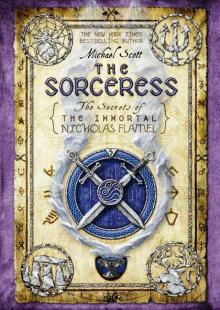 The Sorceress sotinf-3
The Sorceress sotinf-3